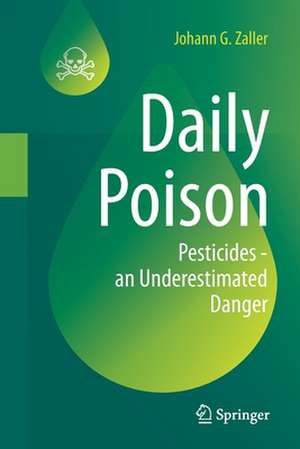Daily Poison: Pesticides - an Underestimated Danger
Autor Johann G. Zalleren Limba Engleză Paperback – 29 oct 2020
The book shares essential insights into the use of pesticides in agriculture, discusses the politics, rhetoric and profits involved, addresses the potential health and ecological risks of pesticides in our daily lives, and debates possible solutions. Does sustainable agriculture exist, and is agriculture without pesticides possible at all?
Moreover, the author gives insight into his scientific work, the set-up of the experiments, and also writes about his very own experiences with the media and press after publication of his studies.
For many years, Johann G. Zaller, an ecologist at the University of Natural Resources and Life Sciences in Vienna, and his team, have been researching applied chemicals and their effects on the environment. Their findings, together with relevant literature and media reports, are presented in this book, which offers a unique resource for anyone who wants to know the nature and background of pesticides and how we come into contact with them in our daily lives.
Ever ate an apple? Read this book!
Preț: 183.80 lei
Nou
Puncte Express: 276
Preț estimativ în valută:
35.17€ • 37.16$ • 29.41£
35.17€ • 37.16$ • 29.41£
Carte disponibilă
Livrare economică 11-25 decembrie
Preluare comenzi: 021 569.72.76
Specificații
ISBN-13: 9783030505295
ISBN-10: 3030505294
Pagini: 305
Ilustrații: XV, 305 p. 9 illus., 7 illus. in color.
Dimensiuni: 155 x 235 x 24 mm
Greutate: 0.5 kg
Ediția:1st ed. 2020
Editura: Springer International Publishing
Colecția Springer
Locul publicării:Cham, Switzerland
ISBN-10: 3030505294
Pagini: 305
Ilustrații: XV, 305 p. 9 illus., 7 illus. in color.
Dimensiuni: 155 x 235 x 24 mm
Greutate: 0.5 kg
Ediția:1st ed. 2020
Editura: Springer International Publishing
Colecția Springer
Locul publicării:Cham, Switzerland
Cuprins
1. What is the problem? Pesticides in our everyday life.- 2. Pesticide impacts on the environment, and humans.- 3. Where are the solutions to the pesticide problem?
Notă biografică
Johann G. Zaller is Associate Professor at the University of Natural Resources and Life Sciences in Vienna, Austria. He studied biology, botany and ecology at the Universities of Salzburg and Innsbruck in Austria. During his postgraduate research career he worked and studied in the United States, Argentina, Switzerland and Germany.
His research group at the University of Vienna investigates how environmental changes influence organisms and ecosystem functions. The group especially is interested in the effects of agricultural management measures (e.g. tillage, crop rotation, mowing, fertilising, pesticide applications) and the impacts of global changes (e.g. elevated atmospheric CO2, ultraviolet-B radiation, rainfall and temperature variations, invasive species).
His research group at the University of Vienna investigates how environmental changes influence organisms and ecosystem functions. The group especially is interested in the effects of agricultural management measures (e.g. tillage, crop rotation, mowing, fertilising, pesticide applications) and the impacts of global changes (e.g. elevated atmospheric CO2, ultraviolet-B radiation, rainfall and temperature variations, invasive species).
Textul de pe ultima copertă
This book is a sound science report about the consequences of pesticides to nature, health and environment.
The book shares essential insights into the use of pesticides in agriculture, discusses the politics, rhetoric and profits involved, addresses the potential health and ecological risks of pesticides in our daily lives, and debates possible solutions. Is agriculture without pesticides possible at all?
Moreover, the author gives insight into his scientific work, the set-up of the experiments, and also writes about his very own experiences with the media and press after publication of his studies.
For many years, Johann G. Zaller, an ecologist at the University of Natural Resources and Life Sciences in Vienna, and his team, have been researching applied chemicals and their effects on the environment. Their findings, together with relevant literature and media reports, are presented in this book, which offers a unique resource for anyone who wants toknow the nature and background of pesticides and how we come into contact with them in our daily lives.
Ever ate an apple? Read this book!
The book shares essential insights into the use of pesticides in agriculture, discusses the politics, rhetoric and profits involved, addresses the potential health and ecological risks of pesticides in our daily lives, and debates possible solutions. Is agriculture without pesticides possible at all?
Moreover, the author gives insight into his scientific work, the set-up of the experiments, and also writes about his very own experiences with the media and press after publication of his studies.
For many years, Johann G. Zaller, an ecologist at the University of Natural Resources and Life Sciences in Vienna, and his team, have been researching applied chemicals and their effects on the environment. Their findings, together with relevant literature and media reports, are presented in this book, which offers a unique resource for anyone who wants toknow the nature and background of pesticides and how we come into contact with them in our daily lives.
Ever ate an apple? Read this book!
Caracteristici
Sheds light on the usage and circulation of pesticides Informs about the consequences of pesticides to nature, health and environment Offers alternative concepts to the use of pesticides Discusses the sustainable use of pesticides Written by an expert in the field and based on scientific research and literature Succinctly and concisely communicated in an easy-to-read-manner
